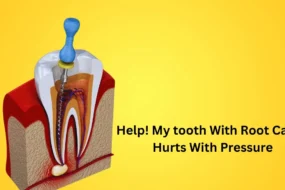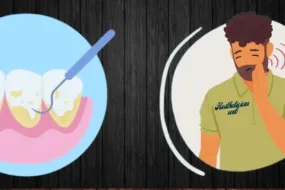
A root canal is a dental procedure designed to alleviate pain and save a tooth by removing infected or damaged pulp from its interior.
Although the cleaning and sealing process is straightforward, it can leave discomfort or a feeling of pressure, especially if the issue involves deep fractures, decay, or an inner chamber.
While the experience may seem intimidating, advanced techniques and modern technology ensure the treatment is effective and painless.
If the pain persists for more than a few days, further procedures or additional cleaning may be required to achieve lasting relief and preserve your natural smile.
My Tooth with a Root Canal Hurts with Pressure
Pain after a root canal under pressure may be caused by lingering infection, nerve irritation, or an improperly fitted crown. Consult your dentist promptly!
Expected Outcome vs. Reality for Some Patients
Most patients expect successful outcomes with minimal discomfort after a root canal. Still, sometimes, the reality includes unexpected pain or sensitivity.
This often happens when pressure is applied to the treated tooth, possibly due to lingering bacteria in the canals or issues like too much or insufficient material during the filling procedure. Such causes can lead to persistent discomfort and tenderness when biting or chewing.
Based on my experience, consulting a dentist is crucial to address these concerns. They can assess the tooth to confirm that the procedure was performed correctly. Taking action early helps avoid complications and helps the therapy achieve its goal.
Possible Causes of Pain under Pressure
Experiencing pain or pressure after a dental procedure can feel disconcerting, especially when the potential causes are unclear. One common factor could be inflammation or a lingering infection caused by bacteria not entirely removed during the procedure.
This can lead to persistent discomfort, particularly in the surrounding tissues. Thoroughly removing harmful bacteria is crucial to addressing this and preventing future issues.
By understanding the situation, you can show why this might occur and take proactive steps to manage it effectively.
- Inflammation and Residual Infection
If a tooth with a root canal hurts under pressure, it may be because bacteria, a sneaky culprit behind inflammation and infection, has not been completely removed.
Dentists tackle this issue head-on by revisiting the affected area to ensure the problem is eradicated, curbing potential post-procedural discomfort. This meticulous approach prevents the spread to surrounding tissues, alleviates lingering issues, and eliminates the trigger causing pain.
By being equipped with precision and taking a proactive step, they protect the specific site and promote a smoother, faster recovery, ensuring a more comfortable experience.
- Nerve Irritation
Nerve irritation can often lead to discomfort under pressure after a root canal. This happens when heightened nerve sensitivity becomes a common aftermath of such dental procedures. Using their expertise, dentists focus on recognizing and managing nerve-related issues by identifying the specific nerves causing the pain.
They implement tailored management techniques to mitigate the issue and ensure a smoother recovery. With targeted strategies, they work to prevent the pain from overshadowing the positive outcomes of the procedure.
Their paramount goal is to prioritize patient comfort, address the nuances of the problem, and promote a seamless recovery journey free from unnecessary pressure-related pain.
- Improperly Fitted Crown
An improperly fitted crown can cause intense pain, especially when biting food. Suppose the crown attached is too big or not properly bonded. In that case, it creates pressure that leads to discomfort and further complications.
- Incomplete Procedure
An incomplete procedure, where the dentist misses a canal, may result in extreme tenderness, root damage, or even ongoing irritation. Root canals must be thorough to prevent lingering pain.
- Loose Filling
A loose filling or loose-fitted crown can cause excruciating pain, which can often turn into a serious dental issue if not addressed. The discomfort may persist with or without pressure.
- Soft Tissue Damage
Soft tissue damage occurs when bacteria or a dental filling seeps into the gums past the root tip, causing tooth pain.
While the tissue recovers, this irritation can significantly affect comfort. Left untreated, these issues may escalate, raising concerns similar to those discussed in “How Long Until a Tooth Infection Kills You?”
Case Study: Uncovering Hidden Problems in Treated Teeth
Accurate diagnosis is essential for successful dental treatment, especially post-root canal complications. Modern diagnostic tools, like X-rays and cone beam imaging, help identify underlying issues that might cause discomfort after endodontic therapy.
From my experience, I’ve seen cases where these tools revealed problems that were otherwise hard to detect, proving how critical they are in managing treated teeth effectively.
When people ask, “Can they put you to sleep for a root canal?“ it’s important to note that while sedation can enhance comfort, resolving underlying complications with accurate diagnostics is crucial for lasting relief.
Example Case Study Involving 33-Year-Old Woman
A 33-year-old woman experienced persistent pain after her root canal procedure, despite multiple visits to her dentist and their assurances that her standard X-ray results looked OK. The discomfort under pressure continued until she visited our dental clinic.
Using CBCT imaging, we identified an overlooked infection deep in the roots of her treated tooth—something traditional X-rays couldn’t detect.
This case underscores how essential it is for patients with prolonged post-treatment symptoms to avoid self-assessment and instead seek expert consultation and advice from field experts to uncover hidden problems.
Effective Approaches to Managing Tooth Pain After Root Canal Treatment
Follow Prescribed Treatment Plans
Adhering to your dentist’s advice and following the prescribed treatment plan is essential for recovery. Medication like pain relievers or antibiotics may be necessary to reduce inflammation and avoid complications.
Over-the-Counter Solutions for Temporary Relief
Non-prescription options like ibuprofen or acetaminophen can offer temporary relief, especially for intense pain. Topical oral gels or ointments with numbing properties can also soothe the area around the treated tooth.
Recognizing Post-Treatment Complications
If your tooth hurts after root canal therapy, it might indicate lingering sensitivity or other symptoms. Issues such as discomfort or pain when biting down or swelling in the gum near the treated tooth could signal complications.
Importance of Early Intervention
Although these problems may arise even after a successful procedure, recognizing the signs early is crucial. If hot or cold stimuli cause pain, the therapy may not be entirely successful.
Consulting Your Dentist
Don’t panic if these issues occur. Schedule an appointment with your dentist to have your concerns checked. Prompt action and open communication with your dental team and healthcare professional will help manage potential failures effectively.
Conclusion
Experiencing discomfort or pressure after a root canal can feel discouraging, but understanding the potential causes and solutions can make the journey to recovery smoother. From lingering infections and nerve irritation to improperly fitted crowns or incomplete procedures, recognizing and addressing these issues early is key to ensuring long-term relief.
Practical strategies, including thorough diagnostics, adherence to prescribed treatments, and timely consultation with dental professionals, are essential for overcoming post-procedure complications. By staying informed and proactive, you can protect your dental health, manage pain effectively, and preserve your natural smile.
FAQ’s
Q: How to get a tooth that needs a root canal to stop hurting?
To ease the pain of a tooth that needs a root canal, try placing ice on the tender area or using a hot pack on the side of your jaw. You can also take over-the-counter pain relievers like Advil or Tylenol or gently swish a combination of salt and warm water around your mouth for relief.
Q: Why is my tooth pain unbearable after a root canal?
If the pain is intense and lasts over a week, the root canal may not succeed. A lingering infection might require medication, further cleaning, or additional procedures. If the discomfort sticks or feels more extended than usual, it warrants attention quickly.
Q: Is it normal for a root canal to hurt with pressure?
Pain may occur immediately after the anesthesia wears off if a portion of the nerve remains or a small piece of an instrument breaks during canal cleaning. This can cause persistent sensitivity when pressure is applied.
Q: How to relax for a root canal?
To reduce anxiety before your root canal, become an informed patient by learning about the procedure to feel more at ease. Try meditation, visualization, or listening to music. Practice self-care or pampering, and think about how your life will improve after the treatment.
She writes to dispel myths, encourage wellness practices, and promote good lifestyle choices. Dr. Lisa Robert writes to leave a lasting impression on her readers’ health and well-being.





